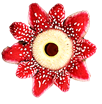Rafflesia kerrii
Rafflesia kerrii is a member of the genus Rafflesia. It is found in the rainforest of southern Thailand and peninsular Malaysia, with the most famous population in the Khao Sok National Park. The local Thai names are Bua Phut (บัวผุด), Yan Kai Tom (ย่านไก่ต้ม) and Bua Tum (บัวตูม). The red flowers have a diameter of 50–90 cm and smell awfully of rotten meat to attract flies for pollination. The plant is a parasite to the wild grapes of the genus Tetrastigma (T. leucostaphylum, T. papillosum and T. quadrangulum), but only the flowers are visible. Small buds appear along the trunk and roots of the host, which after 9 months open the giant flowers. After just one week the flower dies. The species seems to be flowering seasonally, as flowers are only reported during the dry season, from January to March, and more rarely till July.The flower is endangered. Though already naturally rare, tourists trying to get close to the flower for photos easily trample the host plant or young buds. Also the locals collect both buds and flowers both as a delicacy as well as for its claimed medical powers. A concoction of cooked buds or flowers is used as a general tonic, to help for fever or backache or even as a sexual stimulant. However western medicine doesn't recognize any medical power of the flower.The flower is the symbol flower of Surat Thani Province, which is the location of the Khao Sok NP.[1]
References
- , “A Contribution to the Life History of the Rare Indonesian Holoparasite Rafflesia patma (Rafflesiaceae) 1”, Biotropica, vol. 32, pp. 408–414, 2000.

